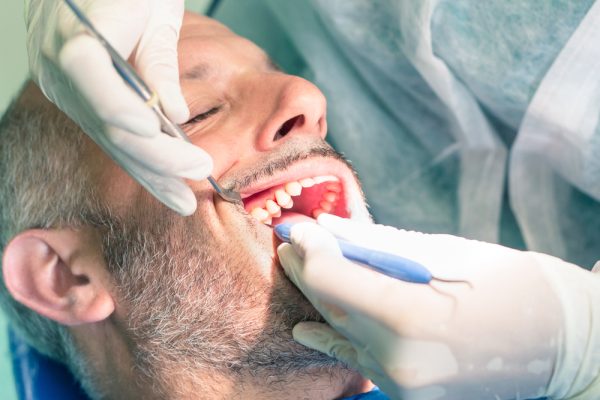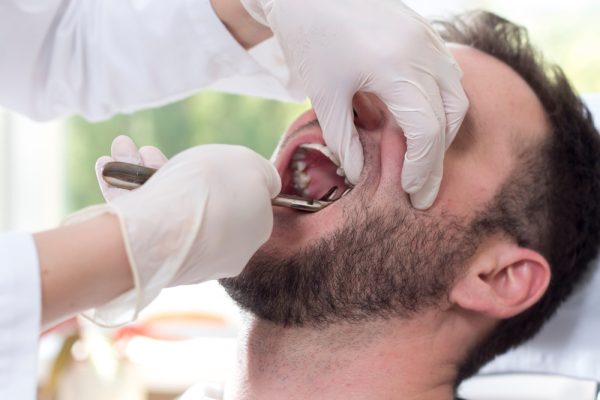Do You Need a Tooth Extracted?
No one looks forward to removing a tooth, but certain situations make it the right choice for better oral health. Dentists in Smyrna, DE, handle tooth extractions with care to address issues like pain or infection. People from nearby Dover, Clayton, and Middletown often seek this service to prevent wider problems.
Before proceeding with extraction, it is important to schedule a consultation to discuss your treatment options and ensure the best approach for your needs. If you want to know if a tooth extraction fits your situation, reach out to Glenwood Dental Associates at (302) 653-5011. Our team can assess and plan the best path forward. During your visit, the dentist will determine whether extraction is necessary based on a thorough examination and x-rays.
What Is Tooth Extraction?

At Glenwood Dental Associates in Smyrna, DE, the goal remains to save natural teeth whenever possible. Preserving the natural tooth is always preferred, so alternatives such as root canal therapyor other treatment options are carefully considered before extraction. When extraction proves necessary, it protects surrounding structures and supports overall health. The process uses local numbing for comfort, with options for sedation in complex cases. Extraction is only recommended as a last resort when other treatment alternatives are not viable.
Types of Tooth Extractions
Several methods exist based on tooth position and condition. Choices depend on visibility and bone involvement.
- Simple Extraction: This handles visible teeth above the gum line. The dentist applies a local anesthetic, loosens the tooth with tools, and pulls it using forceps. Recovery often takes just days, with minimal swelling for most.
- Surgical Extraction: Needed for impacted or broken teeth below the gums. This type of extraction is a surgical procedure often performed as part of oral surgery when a tooth is impacted or broken below the gum tissue. Surgery may involve making incisions in the gum tissue to access the tooth and sometimes removing bone sections. Stitches close the site, and healing may require a week or more, with medication for discomfort.
- Wisdom Tooth Extraction: Often surgical due to impaction in back molars. These third molars get removed to avoid crowding or cysts. Young adults benefit most, as roots form less fully, easing the procedure and recovery.
Benefits of Tooth Extractions
Extractions offer key improvements when other fixes fall short. They resolve immediate concerns and support future dental stability.
- Pain Relief: Removing a damaged tooth ends chronic aches from decay or infection. Patients often feel better soon after, allowing normal eating and speaking.
- Infection Control: Extractions stop bacteria from spreading to gums, bones, or nearby teeth. This halts abscesses and reduces risks of systemic issues like heart strain.
- Space Creation: In crowded mouths, pulling a tooth makes room for orthodontics or alignment. Sometimes, tooth extraction is necessary to create enough room for braces or orthodontic treatment, ensuring teeth can be properly aligned for a healthy smile.
- Prevention of Further Damage: Impacted teeth can shift others or cause cysts if left in place. Extraction avoids these, preserving jaw health over time. Removing problematic teeth can also prevent further complications and support a straighter smile.
- Improved Oral Hygiene: Without a problematic tooth, brushing and flossing become simpler. This lowers plaque buildup and cavity chances elsewhere.
- Support for Replacements: Clearing the site prepares for implants, bridges, or dentures. These restore appearance and chewing strength effectively.
- Cost Savings Long-Term: Addressing issues early through extraction prevents expensive treatments later, like root canals or surgeries.
Ideal Candidates for Tooth Extractions
Certain conditions make extraction the smart option. Our Smyrna, DE dentist evaluates to confirm suitability.
- Those with Severe Decay: When fillings or dental crowns can’t save a tooth, extraction stops decay from advancing. Severely decayed teeth or those with large cavities may need to be pulled if they cannot be restored.
- Patients with Gum Disease: Loose teeth from advanced gum disease, also known as periodontal disease, often need removal to protect the bone and adjacent areas.
- Individuals with Impacted Wisdom Teeth: Teens or young adults facing pain or swelling from unerupted molars benefit greatly. Impacted teeth can lead to other problems, such as infection or misalignment, making extraction necessary.
- People Experiencing Crowding: Orthodontic prep may require pulling teeth for proper spacing.
- Those with Trauma Damage: Cracked or fractured teeth from injuries warrant extraction if repair isn’t viable. Tooth removal may also be necessary if the tooth is infected or causes significant dental pain.
- Patients Preparing for Prosthetics: Denture or implant candidates remove remaining unstable teeth for a better fit.
The Tooth Extraction Process at Glenwood Dental Associates
At Glenwood Dental Associates in Smyrna, DE, the steps ensure safety and minimal disruption.
Initial Assessment: The dentist examines the tooth and takes X-rays to view roots and bone.
- Anesthesia Application: Local numbing agents desensitize the area, with sedation available for anxiety.
- Tooth Loosening: Tools gently rock the tooth free from ligaments.
- Removal: Forceps extract the tooth, or sections if large. The extracted tooth is carefully removed from the mouth to minimize trauma to surrounding tissues.
- Site Cleaning: Debris is cleared, and sockets are smoothed.
- Closure: Stitches seal gums if needed, with gauze for bleeding.
- Aftercare Instructions: Guidance covers pain management and healing.
After this process in Smyrna, DE, many feel ready to heal quickly. Call (302) 653-5011at Glenwood Dental Associates if you suspect a need for extraction.
Tooth Extraction Aftercare for Smyrna Residents
Proper care speeds recovery and avoids issues. Follow these tips post-procedure.
- Bite on Gauze: Press firmly for 30-45 minutes to control bleeding, changing pads as required.
- Limit Activity: Skip heavy lifting or exercise for 24 hours to aid clot formation.
- Manage Pain: Use prescribed or over-the-counter meds for soreness and swelling.
- Ice the Area: Apply packs in 10-20 minute intervals to reduce puffiness.
- Rest Adequately: Keep your head elevated and relax for the first day.
- Avoid Tobacco: Steer clear for 48 hours to support tissue repair.
- Choose Soft Foods: Opt for smoothies, soups, or puddings initially, dodging chewy items.
- Rinse Gently: Use saltwater after 24 hours to clean and soothe.
- Brush with Care: Clean around the site softly to prevent irritation.
- Attend Dental Checkups: Return for monitoring to track progress.
If aftercare instructions are not followed, complications can arise, and issues may worsen if left untreated.
Risks and Complications of Tooth Extractions
Extractions carry low risks when managed well. Prompt attention to any complications is important to prevent further complications. Common ones include:
Bleeding: Minor for hours, but persistent needs attention.
- Infection: Signs like fever prompt a quick response.
- Nerve Issues: Rare tingling in lips or tongue, often temporary.
- Dry Socket: Exposed bone causes pain if the clots dislodge.
- Tissue Damage: Nearby teeth or gums are seldom affected with skilled care.
- Anesthetic Effects: Mild nausea or allergies screened beforehand.
Tooth Extraction Cost
Basic extractions in Smyrna, DE, range $150-$300per tooth. Surgical or wisdom tooth cases climb to $250-$800each, or more for multiples. Factors include complexity, anesthesia, location, insurance, and extras like X-rays. Our team at Glenwood Dental Associates reviews plans—call (302) 653-5011for estimates.
Frequently Asked Questions
The procedure itself brings no pain due to the local anesthetic numbing the site fully. Some pressure occurs during removal, but discomfort stays minimal. Post-procedure, mild soreness arises as numbing wears off, managed with pain relievers. Swelling peaks in 48 hours, but ice helps.
Most resumes take daily routines in three to seven days, depending on the extraction type. Simple cases heal faster, while surgical ones need up to two weeks for full tissue repair. Avoid straws or smoking to protect clots. Follow-ups ensure no delays.
Start with soft, cool foods like yogurt or applesauce once bleeding stops. Avoid hot, spicy, or crunchy items for days to prevent irritation. Gradually add solids as comfort returns. Hydrate well but skip alcohol.
Replacement prevents shifting of remaining teeth and maintains bite balance. Options like implants or bridges restore function and appearance. Discuss with our Smyrna, DE dentist to choose based on health and budget. Untreated gaps can lead to jaw issues.
Contact us immediately at (302) 653-5011 for symptoms like severe pain or bleeding. Early intervention fixes most issues quickly. Good aftercare lowers risks significantly.
Safe and Effective Tooth Extractions at Glenwood Dental Associates
Tooth extractions safeguard health by resolving stubborn problems. They pave the way for stronger smiles through prevention and restoration. Dr. Wisk’s methods focus on comfort and results. Schedule with Glenwood Dental Associates by calling (302) 653-5011. Whether from Dover, Clayton, or Middletown, our Smyrna dentists near youprovide the care you need for lasting wellness.
 Initial Assessment
Initial Assessment Bleeding
Bleeding